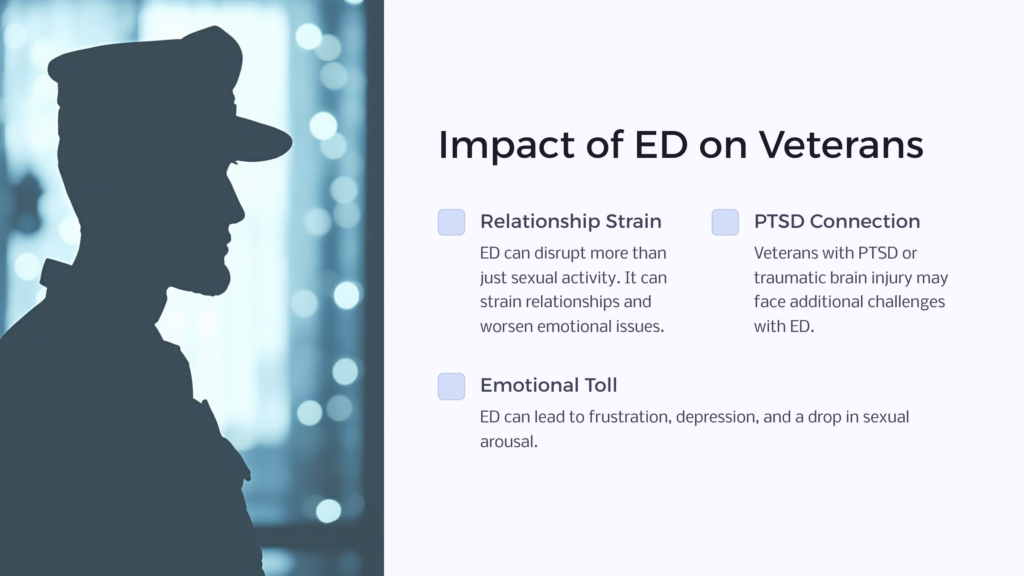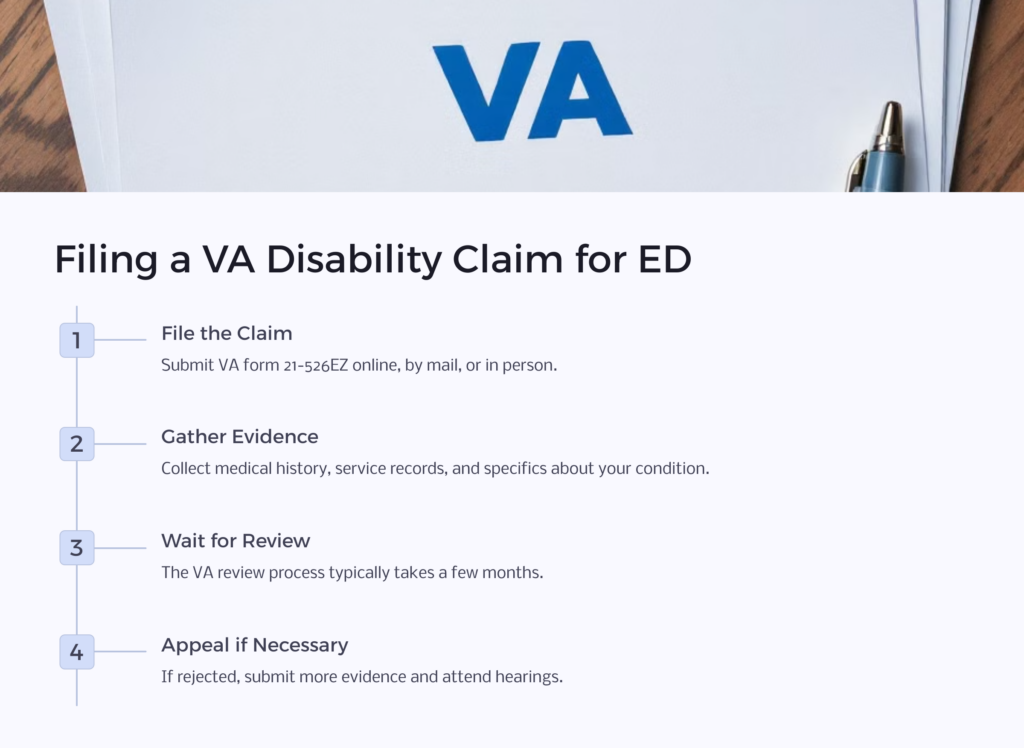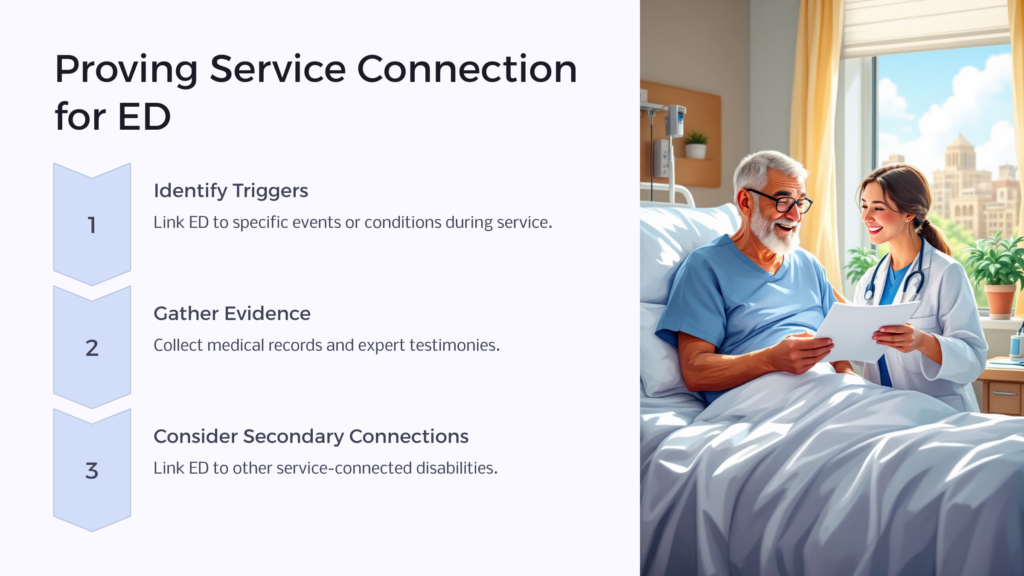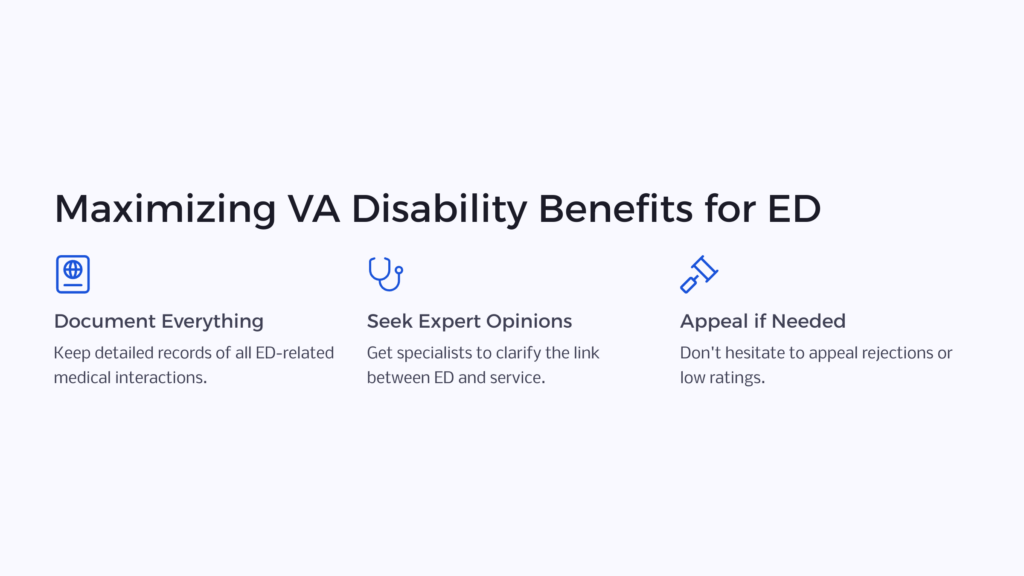
Erectile dysfunction (ED)—a consistent failure to maintain an erection for satisfying sex—affects men at all ages, but it’s more common as they age. Various factors like health, emotions, and lifestyle can contribute; for male veterans, military service can add unique stressors, making ED a possible service connected disability.
ED can disrupt more than just sexual activity; it can strain relationships and worsen emotional issues. This is especially true for veterans grappling with post traumatic stress disorder (PTSD) or a traumatic brain injury.
Veterans with ED may deal with more than just erection issues; a drop in sexual arousal, trouble reaching orgasm, and feelings like frustration or depression can also arise. If you’re going through ED, try to see it as a medical condition—not a personal failure—and to seek professional help.
How Does the Disability Process Work?
If you’re a veteran with ED linked to your service—or made worse by it—you can apply for VA disability benefits. Although the process may seem daunting, understanding the steps and the need for accurate documentation can boost your chances of success.

Filing a VA disability claim
First, file a disability claim through the U.S. Department of Veterans Affairs. You can fill out VA form 21-526EZ to file the claim online or you can fill it out on paper and either mail it in or bring it in person. You will also want your complete medical history, service record, and specifics about your medical condition. Accuracy and thoroughness at this stage are crucial; slip-ups can cause delays or even denials.
Solid medical evidence is vital. To back your claim, consult a healthcare provider about your ED and keep meticulous records—appointments, diagnoses, treatments, and medications. These details can help prove the connection between your service and the onset or worsening of ED.
Waiting Period and Appeals
After filing, expect a waiting period for VA review, which is usually a few months but could take even longer. If your claim is rejected or you disagree with the disability rating, you can submit a VA appeal. Good appeals include submitting more evidence, attending hearings, and arguing for the benefits you’re entitled to.
By navigating these steps carefully, you can optimize your chances for a successful VA disability claim, leading to essential financial and medical support.
Where does ED fall on the VA disability rating scale?
For any VA-rated condition or disorder, the severity will largely determine the VA’s disability rating. The VA uses a standard rating system to evaluate the impact of ED on your overall health.
Disability Ratings and Impairment Levels
VA disability rating uses a 0-100 scale; higher percentages mean worse impairments. The specific VA rating for ED considers how often symptoms occur, their severity, and how well treatments and ED medications work. Even occasional symptoms could qualify you for a rating, so don’t rule it out.
Treatment Factors
The VA also looks at the treatments you’re undergoing. If your ED medications or other treatments cause side effects—like discomfort, pain, or emotional distress—this can bump up your disability rating. The overall impact of treatment on your quality of life is also assessed.
Monitoring and Reassessment
Keep in mind that your ED rating isn’t set in stone. Veterans Affairs can review it periodically to see if your condition has changed (either improved or worsened). Maintaining up-to-date medical records and keeping the VA in the loop about any changes is critical. Otherwise, if you have a history of not seeking/recording treatment, it will hurt your chances of continuing to be approved.
Understanding the Link Between Service Connection and Erectile Dysfunction

Proving that your ED is related to military service is crucial for getting VA disability benefits. While it’s sometimes obvious how the two connect, your claim should outline the connection as clearly as you can.
First, think back on your military service. Did any specific events or conditions possibly contribute to your ED? It may not even be directly related to sexual trama. Triggers could range from physical injuries and mental stressors to environmental exposures or even medication side effects.
Gathering Medical Evidence
Medical records are often the difference between a winning and losing case. Gather any diagnosis, treatment, or medication records related to your ED. Testimonies from your healthcare provider and medical experts linking your ED to military service can be especially valuable.
Secondary Service Connection
Sometimes, your ED might be a side effect of another service connected disability like diabetes or spinal injuries. In these cases, showing how that primary disability links to your service can bolster your ED claim—especially if you already have a rating for the primary condition.
Seeking Professional Help
The application process can be complicated, but you have many allies ready to help. Veterans service organizations (VSOs) and legal pros specializing in VA claims can offer essential advice, guiding you through regulations and requirements.
Maximizing Your VA Disability Benefits for Erectile Dysfunction

To get the VA disability benefits you deserve for ED, you’ll need a proactive, detailed approach. Here’s how to make your claim as strong as possible.
Documenting Your Condition
First and foremost, keep detailed medical records. Include everything—from doctor visits and diagnoses to treatments and medications related to your ED. Solid, consistent records are your best tool for proving the extent of your condition.
Seeking Expert Medical Opinions
Don’t hesitate to get expert opinions; they can strengthen your claim. Look for specialists who can clarify the link between your ED and your military service. Their insights can underscore how your service contributed to or worsened your condition.
Appealing a Decision, if Needed
Don’t give up if your first claim is rejected or you get a lower rating than you deserve. You have the right to appeal; you’ll just need to gather even more evidence and expert opinions. Successful appeals often result in more accurate disability ratings—and the benefits that come with them.
Taking Care of Your Overall Well-Being
While securing VA benefits is crucial, your overall health shouldn’t take a backseat. Seek treatment, explore therapy options, and maintain a healthy lifestyle. These steps not only improve your ED but can also uplift your general quality of life.
Finding Benefits
Seeking disability benefits isn’t just about the money—it’s also about recognizing the impact of a condition linked to your time in service. This isn’t just financial aid; it’s the support you need for a fuller, healthier life. Your VA benefits are there for the taking.
Start now. Dig up those medical records and consult with medical experts for their invaluable insights. If your initial claim doesn’t cut it, appeal! These benefits aren’t a legal formality, but a salute to your sacrifices.
If you’re a veteran grappling with ED, there are things you can do to take control of your situation. We’re here to help, too; take our free assessment to see if you qualify for free application aid.
 Benefits.com Advisors
Benefits.com Advisors
With expertise spanning local, state, and federal benefit programs, our team is dedicated to guiding individuals towards the perfect program tailored to their unique circumstances.
Rise to the top with Peak Benefits!
Join our Peak Benefits Newsletter for the latest news, resources, and offers on all things government benefits.



















